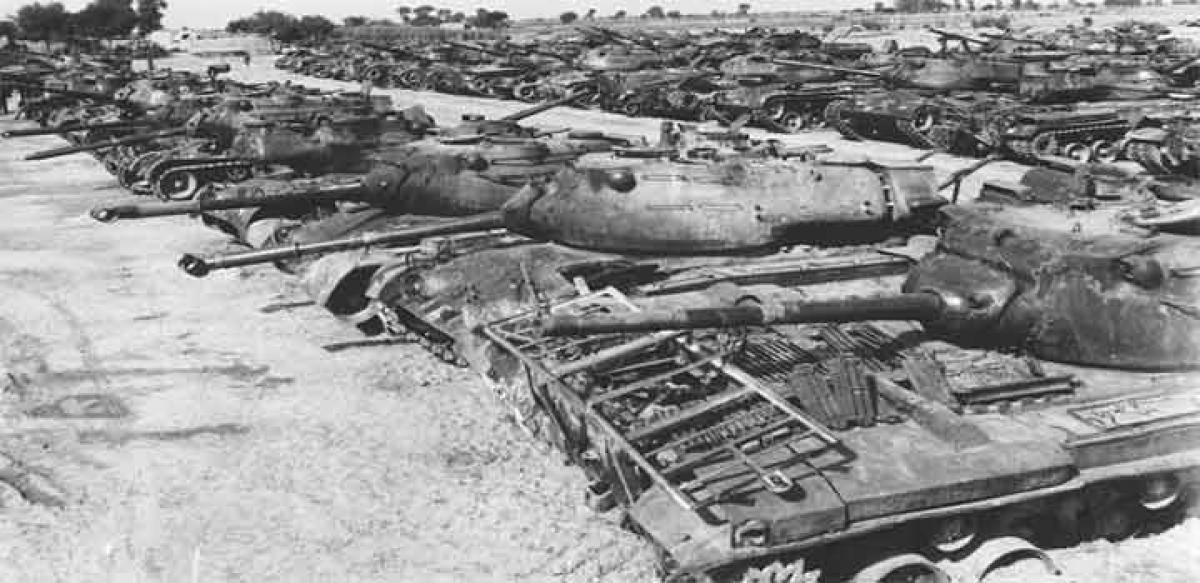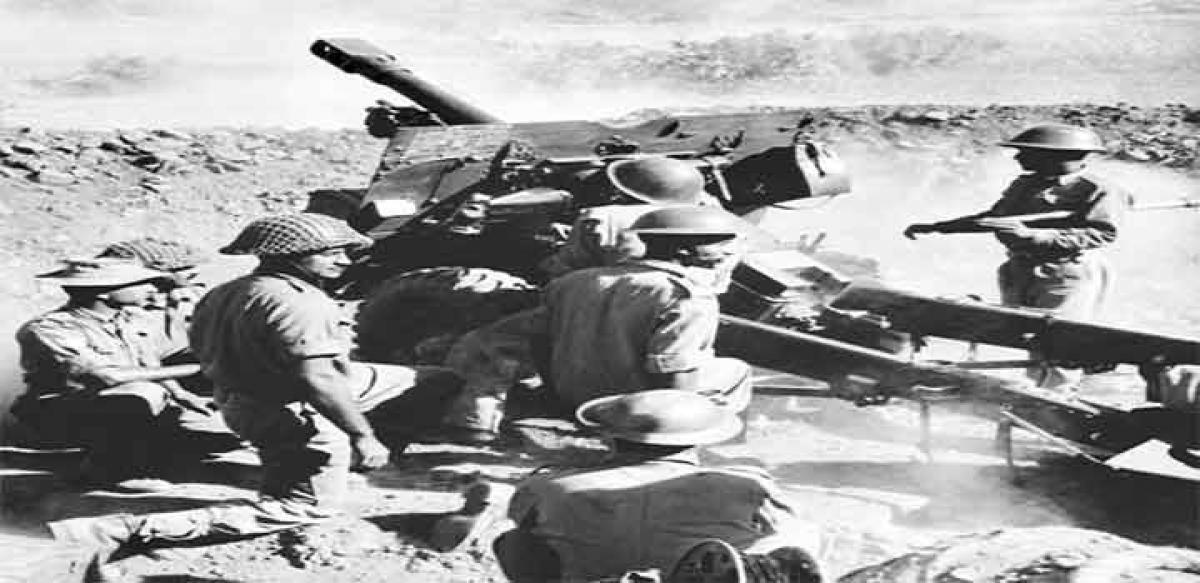Live
- Centre Reimposes AFSPA in Disturbed Areas Of Manipur Amid Ongoing Ethnic Violence
- Karnataka Liquor Scam Reignites BJP-Congress Corruption Allegations
- Himachal Pradesh Warns Against Malicious Wedding Invite Scams On WhatsApp
- Union Minister Alleges 'Land Jihad' By Powerful Waqf Board In Kerala
- How Hybrid Electric Cars Work: A Complete Guide to Hybrid Technology in India
- Understanding Consciousness in the Bhagavad Gita: Spiritual and Universal Awareness
- Are you Vitamin B9 deficient? Find out the signs and solutions.
- Telangana Government's Caste Enumeration Initiative Aims for Social Justice and Economic Equality
- PSEs are helping small firms to scale up: OIL CMD
- Bengal: BSF seizes over 1 kg gold in two separate incidents
Just In

This month, India and Pakistan are both celebrating “victory” over each other in a war they fought 50 years ago. The catch is that there was no victory. In military terms, it was a stalemate. It is fine for any people to remember those, mostly young, who died in that war. Whoever caused the war and whoever won or lost it, they deserve total respect.
.jpg)
The real story of the 1965 war has largely been missing in the media discourse in both countries. Fifty years hence, it should be possible for India to acknowledge that it was surprised in 1965, not once but twice. This happened again, three decades later, in Kargil as well.
Factors that determined the outcome in 1965 were Pakistan’s grand attack plans, badly executed, and India’s defence and counter-attack. Opening up fronts across Punjab to ease Pakistani pressures in Kashmir, the generals envisaged a good strategy, but it was executed with faulty tactics. This is the verdict of the discerning military analysts, not given to jingoism, on both sides
This month, India and Pakistan are both celebrating “victory” over each other in a war they fought 50 years ago. The catch is that there was no victory. In military terms, it was a stalemate. It is fine for any people to remember those, mostly young, who died in that war. Whoever caused the war and whoever won or lost it, they deserve total respect.
But when people turn triumphalist, they run the risk of losing perspective that enables the question: have we learnt from past, particularly our past mistakes?The current phase of relationship, when each meeting has been followed by tensions on the border and war of words, leading to a cancelled meeting and more hostility, has hugely contributed to the mood for ‘official’ celebrations.
The real story of the 1965 war has largely been missing in the media discourse in both countries. Fifty years hence, it should be possible for India to acknowledge that it was surprised in 1965, not once but twice. This happened again, three decades later, in Kargil as well.Pakistani troops first waded into Kutch in January 1965. It was but a diversion from the bigger surprise in Kashmir, where 1,50,000 guerillas posing as “freedom fighters” were infiltrated. But it did not work. Local Kashmiris resisted the guerillas, leading to a full-fledged war.

Under pressure, India deployed its air force, something Pakistan was unprepared to face. It also opened another front along the international border, upsetting Pakistan’s grand plans. In tank battles, rated as the biggest since World War 2, Pakistan lost more than 450 tanks while India lost fewer than 100. Officially, India lost 2,862 soldiers. Pakistan disputes the toll figure of 5,800, partly because it need not keep count of the mujahideen it had deployed. That also got repeated in Kargil, with similar results.
Factors that determined the outcome in 1965 were Pakistan’s grand attack plans, badly executed and India’s defence and counter-attack. Opening up fronts across the Punjab to ease Pakistani pressures in Kashmir, they envisaged a good strategy, but it was executed with faulty tactics. This is the verdict of the discerning military analysts, not given to jingoism, on both sides.
The British, too, surmised this. After all, it was the British Indian Army now manning the borders they had created. The erstwhile colonial army had been trained for defence, and not offence – the principal reason why India held out and Pakistan’s plans failed. At the helm on both sides were Sandhurst-trained officers who had fought the World War 2, but since then, had not planned a military campaign.
Military historians say that wielding political power, Ayub, the self-proclaimed Field Marshal, had lost touch with things military – literally, since the Generals did not inform him that their campaign had collapsed.The real architect of the 1965 war was ambitious Foreign Minister Z A Bhutto.
He had got the Corps Commanders on his side and pushed the idea of capturing Kashmir, creating visions of raising the flag on Delhi’s Red Fort. No wonder it was named “Operation Grand Slam.” Huge territories were won and lost by both sides, but they returned to the status quo after the Tashkent pact signed in January 1966. The military on both sides resented this.
Pakistan, never apologetic about initiating the conflict to ‘liberate’ Kashmir, has all along claimed victory. But its official narrative is badly punctured by Najam Sethi, Editor of Friday Times. In his “Aapas Ki Baat” TV interview, he has said that Pakistan initiated all wars it has fought with India and lost each one of them.
He qualified his assertions by explaining that since it was Pakistan that initiated each conflict with clear military and political plans, and since they were not achieved, these could only be termed as defeats.Writing in Dawn, Pakistani author Zahid Hussain has also debunked the triumphal discourse that the military and political leadership are together engaging. “Pakistan was not the same after this war and its people paid a heavy price for the military misadventure, but they have not been told the real story half- a-century hence.”
A reader responding to Hussain’s piece says: “wish we knew this earlier – 1971 would not have happened.” The celebrations help raise nationalist sentiments. In India, they are in tune with the current political dispensation that is pro-active vis-a-vis Pakistan. In Pakistan’s case, they boost public confidence in the military leadership. However, it glosses over the blunders that brought Pakistan to the brink of a military debacle in a war which it had initiated.
Zahid Hussain appeals that all concerned in his country “let go of the myth of a victory that never was. The limited success our forces achieved in certain sectors must not be used to cover up the miscalculations and flawed military strategy. We have never recovered from the effects of that military misadventure.”
Air Marshal Nur Khan, who led Pakistan’s air force, called it “a wrong war” that was planned “for self-glory rather than in the national interest.” Whatever the outcome, both sides were scarred. India devalued the rupee next year. Pakistan’s erring generals grew stronger. Bhutto, the mastermind, blamed it on Ayub and helped his removal.
His ambitions, combined with those of the generals, sowed the seeds of secession of Pakistan’s east-wing that had felt abandoned in 1965. It triggered another conflict and Bangladesh’s birth in 1971. This time India was not surprised.India’s Lt Gen. (retd.) Prakash Katoch writes: “What have we learnt post Pakistan’s Operations Gibraltar and Grand Slam during 1965? Apparently, not much as we still are without a strategic culture. India’s higher defence structures do not match the 21st century conflict scenarios.
The military is still kept outside strategic planning and decision-making on matters military. Generalist bureaucrats man the Ministry of Defence and the users (military) are deliberately kept out of the planning, decision-making and even design levels of the defence-industrial complex.
“India is still without a National Security Strategy while national security objectives remain undefined and comprehensive defence review is yet to be undertaken. India is still without an effective deterrence against Pakistan’s proxy war. The question is whether the present government can cure the Parkinson’s disease afflicting the defence of the country.” Be it India or Pakistan, history has to be put straight so that the mistakes are not repeated.
By:Mahendra Ved

© 2024 Hyderabad Media House Limited/The Hans India. All rights reserved. Powered by hocalwire.com







